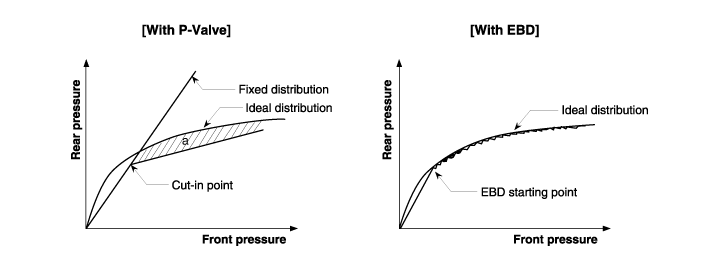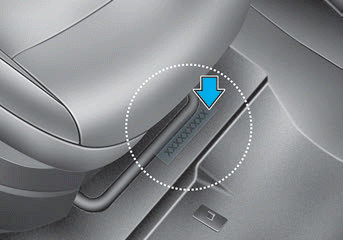Hyundai Venue: ABS(Anti-Lock Brake System) / EBD(Electronic Brake-force Distribution). Description and operation
Hyundai Venue (QX) (2020-2025) Service Manual / Brake System / ABS(Anti-Lock Brake System) / EBD(Electronic Brake-force Distribution). Description and operation
| Description |
The EBD System (Electronic Brake force Distribution) as a sub-system of the
ABS system is to control the effective adhesion utilization by the rear wheels.
It further utilizes the efficiency of highly developed ABS equipment by controlling
the slip of the rear wheels in the partial braking range.
The brake force is moved even closer to the optimum and controlled electronically,
thus dispensing with the need for the proportioning valve.
The proportioning valve, because of a mechanical device, has limitations to
achieve an ideal brake force distribution tothe rear wheels as well as to carry
out the flexible brake force distribution proportioning to the vehicle load
or weight increasing. And in the event of malfunctioning, driver cannot notice
whether it fails or not.
EBD Controlled by the ABS Control Module, calculates the slip ratio of each
wheel at all times and controls the brake pressure of the rear wheels not to
exceed that of the front wheels.
If the EBD fails, the EBD warning lamp (Parking brake lamp) lights up.
Advantages
| – |
Function improvement of the base-brake system.
|
| – |
Compensation for the different friction coefficients.
|
| – |
Elimination of the proportioning valve.
|
| – |
Failure recognition by the warning lamp.
|
Comparison between Proportioning valve and EBD

 Troubleshooting
Troubleshooting
Standard Flow of Diagnostic Troubleshooting
Notes With Regard To Diagnosis
The phenomena listed in the following table are not abnormal.
Condition
Explanation
System check sound
When starting the engine, a thudding sound can sometimes be heard coming
from inside the engine compartment...
 ABS Control Module. Components and components location
ABS Control Module. Components and components location
Components
1. Front - right tube
2. Rear - left tube
3. Rear - right tube
4. Front - left tube
5. MC SEC
6...
Other information:
Hyundai Venue (QX) (2020-2025) Service Manual: Troubleshooting
TPMS Inspection method Inspection • Find the inspection number by referring to the table above. • The following content is irrelevant of the inspection procedure...
Hyundai Venue (QX) (2020-2025) Service Manual: Torque Converter Control Solenoid Valve (T/CON_VFS). Specifications
Specifications ▷ Control type : Normally low type Shape Items Specifications Control current (voltage) [mA] 0 - 850 Supply pressure [kpa (kgf/cm², psi)] 539...
Categories
- Manuals Home
- 1st Generation Venue Owners Manual
- 1st Generation Venue Service Manual
- Shift-lock system, Shift-lock release, Parking
- Theft-Alarm System
- Vehicle Identification Number (vin), Vehicle Certification Label
- New on site
- Most important about car
Vehicle Identification Number (vin), Vehicle Certification Label
Vehicle Identification Number (vin)

Frame number
Copyright © 2025 www.hvenueqx.com
